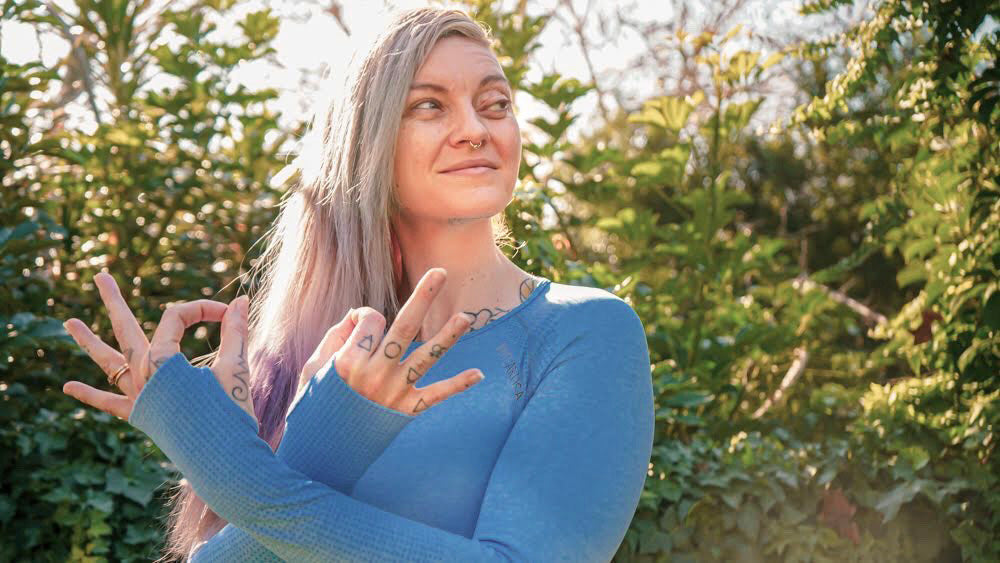Mischa’s own daily practice is a morning ritual, moving & meditating before heading out into the world. She loves offering students a deep breath & a few moments of joy - a chance to meet themselves.
For her, yoga is much more than the physical asana practice on the mat, it is a living breathing prayer.
Read her interview below to discover more.

What does it mean to be a yogi and how do you become one?
A yogi is often simply referring to someone who practices yoga, just like any other occupation or sport. Some traditions differentiate between male & female as “yogi” & “yogini” similarly to actor & actress. However, regardless of gender identity, it may not be appropriate to consider all practitioners of yoga - yogi’s, based on the culture & tradition of yoga itself.
How your daily practices help you to have a balanced wholesome life?
My day begins with my practice, which is yoga asana (the postures), pranayama (breath work), meditation (dhyana) & often tea, incense, tarot cards & journalling. I find that by making time to meet myself before heading out into the world or engaging with others, gives me perspective on how I truly am today, in body, mind & spirit.
Yoga is a practice - of observation, of self awareness, of non judgement. There is no right or wrong but the yoga tradition & sacred scripture teaches us techniques & tools that we can use to better understand ourselves, & therefore others, the world around us & the deep interconnected nature of all things in our universe.
I take time to practice in the evenings, mostly meditation, before bedtime & if I’m having a particularly long or stressful day (yes - even yoga teachers are not zen all of the time!) I will also make sure I take time out to at least pause & breathe.
What's the importance to have healthy nutrition alongside a regular activity?
In traditional yoga lineages, diet & lifestyle are equally (if not more so) important factors as the yoga asana itself that we practice on the mat. In fact, you could say that the real yoga happens off the mat. There are many guidelines that include diet such as the Yamas & Niyamas as recorded by Maharishi Patanjali in The Yoga Sutras. An example is “ahimsa” which can be translated to non-violence. In terms of what you eat, this is the consideration of how the food has come to be consumed by you. Some yoga practitioners would say this means to be vegan so as not to harm animals, or perhaps that your food should be local & organic so as not to harm the planet. Ahimsa can also be interpreted as non violence towards yourself - so eating fast food or drinking alcohol could be considered violence to your body itself!
Another yogic way of looking at nutrition is the sister science to yoga - Ayurveda. The lifestyle (including diet) guidelines from this rich system are organised into three “doshas” or types of people - kapha (earth), pitta (fire) & vata (air). Depending on your physical, mental & emotional attributes, each dosha can be calculated & accessed to provide guidance on which kinds of exercise, foods & other activities may be appropriate to keep you in balance.
Is yoga a way of life or a way to exercise and meditate?
Yoga & meditation are very different things in themselves - yoga in western culture generally refers to the asana or postures we practice on the mat & while it may seem quite meditative, just like people find surfing or gardening meditative, it is not truly “meditation” which is a complete practice in itself. Traditionally yoga asana is used to prepare the body physically & energetically to sit in formal meditation.
True yoga is definitely a way of life & should be considered completely separate to exercise. It is a practice & if we refer to the sacred scripture of Maharishi Patanjali, there are actually eight steps to living yoga, with yoga asana & mediation being only two of them. The others are things like personal observances, environmental restraints, breathing practices, contemplation, etc.
Can you give some examples of how yoga has helped with your own health?
In many ways, yoga has changed my life. Prior to teaching I worked in middle management, under a lot of external & self imposed pressure & stress. When I found yoga I firstly experienced a significant shift in the tension & soreness my body was physically manifesting. I had constant pain in my shoulders & upper back for as long as I can remember. It has completely disappeared.
Along with this, I remain in a kind of “bliss state” post yoga which I’ve never encountered through any other kind of exercise, different to the endorphin high from lifting weights or doing cardio. Everything looks & feels slightly different - the world seems to burn a little brighter, I am much more able to see the beauty in my day to day! In terms of my mental health journey, yoga has completely changed the state of my mind & I truly believe it is medicinal, healing in so many ways.
How to be a yoga instructor affected your life?
When I found yoga, it impacted me so much that my whole life changed - I left my corporate job to study, I left a long term relationship, I moved cities - pretty much every big life change you can think of. I had been practising daily for about 6 months & I was on a yoga retreat when another student asked me if I was a yoga teacher. In that moment I could only reply “no” while my whole being vibrated with “yes” - it’s when I knew without a doubt that its what I wanted to do & I have been living the yoga life ever since.
Mostly though, anecdotally yoga sneaks up on you. For example a close friend of mine wanted to love yoga but at first she really didn’t! She went to about 20 different classes in 6 months before finally finding the right class for her. Now after many years of practice, she is studying to be a teacher herself! Another example is in the corporate sphere, where more & more companies are seeing the benefits of having a “wellness” program as part of their staff perks. Not only do employees report higher levels of overall happiness & job satisfaction, but they may also measure increased productivity.
What is the advice you give to people that want to approach a yogi lifestyle but don't know where to start?
There are many ways to begin & I believe you will know it when you experience it. Don’t be put off if you don’t like your first (or many after) yoga class, or you find meditating hard. Part of the practice is noticing & being ok with discomfort so that when the right teacher or class or practice finds you, you will know. Yoga is about feeling, getting into your body & out of your head, which can be extremely challenging in todays society filled with the busyness of life & the need to be always doing. Pause, breathe, notice - how are you really?
Perhaps you are the kind of student who prefers to read some of the classical yoga texts too understand the system prior to trying it or maybe just diving in & attending a Foundation or Beginners class as an introduction to a teacher, practice or studio is a good first step for you. Take the time to really notice how you feel, even if it’s not “positive”, don’t shy away from yourself. All of this talk of “good vibes only” can be harmful if you’re not allowing yourself to feel when there aren’t good vibes!
It’s ok to not know - most students who come to their first class are nervous & don’t trust themselves to simply close their eyes & follow the guidance of the teacher. Even instructing something as simple as “raise your arms above your head” is often met with students looking around wildly to check if they are doing the right thing! It’s how we are conditioned, but in yoga - there is no right thing! Only your experience in your body & mind.
What type of yoga do you teach?
My lineage & personal practice is Traditional Tantric Hatha Yoga, however it’s quite uncommon to find this type of yoga in Sydney as most studios offer Vinyasa or Flow style practices. I teach a variety of class levels from Dynamic or Power Flow to Slow Flow as well as more meditative practices like Yin Yoga & Yoga Nidra plus Meditation itself.
What makes your teaching style unique?
Someone said to me last week “a lot of people teach yoga, but yoga seems to really flow through you” which for me is a huge compliment as I’d like to think that I am very respectful of the ancient yoga tradition. I’m not here to reinvent the wheel, yoga works all on its own & my purpose is to simply offer the practice. As I often say “take what you need, leave the rest.”
Aside from being of service as my authentic self, I respect the tradition through sequencing asana energetically as well as the physically, I use Sanskrit language, chant mantra, offer mudra & yoga philosophy in every class. For me it’s not about the pose, it really doesn’t matter if you can stand on your head - can you be so present for yourself & breathe deeply for an entire class? That’s a real advanced practitioner to me.
Mischa teaches yoga & meditation in studios around Sydney (Humming Puppy, Yogatime, Paramount Recreation Club) as well as private & corporate clients liked Linked In, Facebook & Microsoft.
Connect with Mischa on Instagram @mischaism
or on the web www.infusedyoga.com.au

